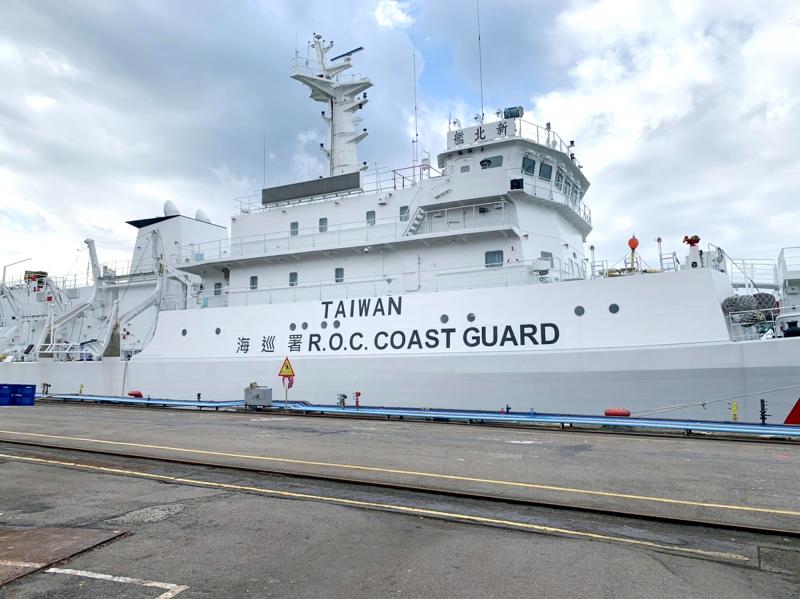President Tsai Ing-wen (蔡英文) has instructed the Coast Guard Administration (CGA) to add the name “Taiwan” to its patrol vessels to increase the nation’s international visibility at sea, Presidential Office spokesman Xavier Chang (張惇涵) said yesterday.
Chang’s statement came after the Chinese-language United Daily News reported earlier that the CGA was ordered by “high-level security officials” to add the name “Taiwan” next to the “Republic of China Coast Guard” designation on patrol vessels.
While the CGA initially denied having received such instructions, Chang said in a statement that the so-called “high-level security official” was Tsai.

Photo courtesy of the Coast Guard Administration via CNA
At the launch of a new coast guard vessel — the Anping (安平) — in Kaohsiung on Dec. 11 last year, Tsai said that the vessel was good, but would be better if it were marked with “Taiwan,” so that coast guard personnel would be more clearly recognized by the international community when enforcing the law at sea, Chang said.
Nearly 300,000 foreign-flagged vessels sail the seas surrounding Taiwan every year, he said.
Coast guard personnel are tasked with patrolling the nation’s territorial waters and combating maritime crimes, he said, adding that they drove away many illegal dredging vessels operating near Lienchang County’s Matsu last year.
They are more burdened after China on Feb. 1 enforced its China Coast Guard Law, he said.
The legislation empowers Chinese coast guard personnel to inspect foreign vessels in waters claimed by China and use weapons — hand-held, ship borne or airborne — on foreign vessels.
Using the name “Taiwan” on CGA vessels would allow coast guard personnel to be better recognized and do their job more safely, Chang said, adding that “no provocation” and “no surrender” remain the government’s abiding positions.
The CGA said that it began adding the name “Taiwan” on some vessels last month, while 225 have yet to have the name added.
Senior adviser to the president Koo Kwang-ming (辜寬敏) applauded Tsai’s move.
Taiwanese consciousness is lacking in the nation and people are glad to see that Tsai is willing to lead Taiwan to become normalized, Koo said in a news release yesterday.
However, Koo also said he hoped that Tsai would modify the Constitution, which is grounded in the “one China” concept, or Taiwan would not be able to break free of its global predicament and the “one China” framework.
Additional reporting by CNA

SECURITY: As China is ‘reshaping’ Hong Kong’s population, Taiwan must raise the eligibility threshold for applications from Hong Kongers, Chiu Chui-cheng said When Hong Kong and Macau citizens apply for residency in Taiwan, it would be under a new category that includes a “national security observation period,” Mainland Affairs Council (MAC) Minister Chiu Chui-cheng (邱垂正) said yesterday. President William Lai (賴清德) on March 13 announced 17 strategies to counter China’s aggression toward Taiwan, including incorporating national security considerations into the review process for residency applications from Hong Kong and Macau citizens. The situation in Hong Kong is constantly changing, Chiu said to media yesterday on the sidelines of the Taipei Technology Run hosted by the Taipei Neihu Technology Park Development Association. With

A US Marine Corps regiment equipped with Naval Strike Missiles (NSM) is set to participate in the upcoming Balikatan 25 exercise in the Luzon Strait, marking the system’s first-ever deployment in the Philippines. US and Philippine officials have separately confirmed that the Navy Marine Expeditionary Ship Interdiction System (NMESIS) — the mobile launch platform for the Naval Strike Missile — would take part in the joint exercise. The missiles are being deployed to “a strategic first island chain chokepoint” in the waters between Taiwan proper and the Philippines, US-based Naval News reported. “The Luzon Strait and Bashi Channel represent a critical access

‘FORM OF PROTEST’: The German Institute Taipei said it was ‘shocked’ to see Nazi symbolism used in connection with political aims as it condemned the incident Sung Chien-liang (宋建樑), who led efforts to recall Democratic Progressive Party (DPP) Legislator Lee Kun-cheng (李坤城), was released on bail of NT$80,000 yesterday amid an outcry over a Nazi armband he wore to questioning the night before. Sung arrived at the New Taipei City District Prosecutors’ Office for questioning in a recall petition forgery case on Tuesday night wearing a red armband bearing a swastika, carrying a copy of Adolf Hitler’s Mein Kampf and giving a Nazi salute. Sung left the building at 1:15am without the armband and apparently covering the book with a coat. This is a serious international scandal and Chinese

COUNTERINTELLIGENCE TRAINING: The ministry said 87.5 percent of the apprehended Chinese agents were reported by service members they tried to lure into becoming spies Taiwanese organized crime, illegal money lenders, temples and civic groups are complicit in Beijing’s infiltration of the armed forces, the Ministry of National Defense (MND) said in a report yesterday. Retired service members who had been turned to Beijing’s cause mainly relied on those channels to infiltrate the Taiwanese military, according to the report to be submitted to lawmakers ahead of tomorrow’s hearing on Chinese espionage in the military. Chinese intelligence typically used blackmail, Internet-based communications, bribery or debts to loan sharks to leverage active service personnel to do its bidding, it said. China’s main goals are to collect intelligence, and develop a